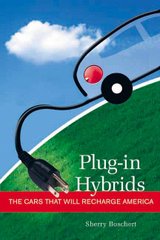The California Air Resources Board's (CARB) monthly meeting today included the adoption of the State Alternative Fuel Plan. The analysis by the California Energy Commission (CEC) and CARB of the smorgasbord of non-petroleum alternatives was mandated by AB 1007. And quite a buffet it is. When I told CEC Commissioner James Boyd a couple of weeks ago at the plug-in hybrid vehicle (PHEV) UC Davis press event that I felt battery electric vehicles (BEV) were not fairly represented, he told me that each "fuel" feels slighted, so they must have done something right.
But it seems clear to me some were more slighted than others. The biofuel folks weren't complaining about their designation as the short term best hope for greenhouse gas and petroleum reduction. Advanced biofuels, plug-in hybrids, hydrogen and fuel cells received the long-term plaudits in the Plan. Natural Gas felt the most aggrieved, and a number of representatives of NG made public comments today asking for greater recognition. And they didn't hesitate to go after the favored alternatives. They pointed out in public comment the particulate flaws in biofuels and the issues unresolved, cost undiminished and promise unfulfilled of hydrogen and fuel cells. Usually NG and hydrogen appear wedded at the hip. H2 is most often produced by cracking natural gas, even if the talk is all about "renewable" hydrogen. A crack indeed.
No one has a bad word to say about plug-in hybrids these days, and they receive favorable mention in the Plan. Not so for full-function battery electric vehicles, which fall victim to extremely unfavorable predictions about their cost, mostly batteries, far into the future. In the Plan, they inexplicably don't fare much better in economic terms than outrageously expensive fuel cell cars, which nonetheless remain the preferred darling, even if the date of commercialization is decades away. Board Member Sperling suggested that the long term prospects of FCVs ought trump the near term benefits of competing technologies.
What was most welcome by this advocate of transportation electrification was the statement by Sierra Club California's Bill Magavern. He questioned the continued preference for hydrogen and fuel cells in the Plan. He proposed that a more logical scenario than any appearing in the document was a pathway from PHEV to BEV. As battery costs drop with the expected market penetration of plug-in hybrids, full BEVs should become marketable true zero emission cars much more rapidly than appears likely with fuel cells. And of course the electric infrastructure is already in place and getting cleaner and more renewable. I couldn't agree more.
Although this Plan was approved, it was referred to by staff as a mere "snapshot" in time of an evolving landscape. Board Member Supervisor Roberts asked for staff to prepared clearer statements of the relative benefits and efficiencies of the various "fuels" and Chair Nichols said she expected biennial if not annual reviews and revisions. While an important statement of the way CARB and CEC see alternative fuels today, it does not seem to be a defining document that binds the alternative fuel options to be pursued in the future.
Thursday, November 15, 2007
Subscribe to:
Comments (Atom)


